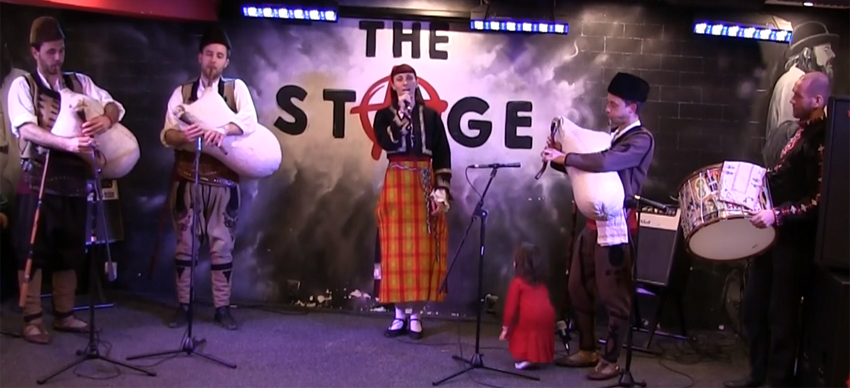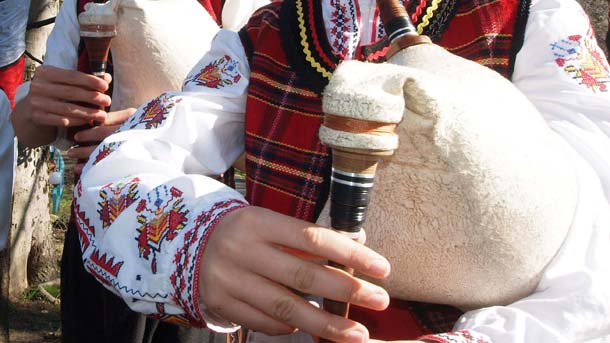“In our day anyone wanting to learn to play the Bulgarian bagpipe can do so in the comfort of their own home. Yet, unquestionably the best place to get a taste of the magic of this instrument is the Rhodope Mountain,” says Tsvetelin Andreev, the man who created the online platform www.kabagaida.com. A software engineer by profession, his hobby - the bagpipe has constantly been tugging him towards the Rhodopes, but it has also been the reason why he has been travelling the world.
“The online platform brings together several projects, its mission being to help as many people as possible learn about the kaba gaida (low-pitched bagpipe). It offers online bagpipe playing courses and is a way for people from all over the world to share their knowledge. It is a presentation website for the children's studios and educational seminars we organize, as well as of our Kaynak pipers band, which has been taking part in international events popularizing the instrument. The online training includes free educational material - articles, translated into English, videos, musical scores, all of them useful in the process of self-tuition. Of course, they can only provide the basis on which to build. The next step are the online courses - we have a syllabus we follow in one hour sessions with the students. The sessions take place in real time; when there is a time difference or there is some other reason that precludes a direct session, communication is by recordings.”

Users of the website are mostly Bulgarians living abroad, foreigners with an interest in folklore from Bulgaria and the Balkans as well as bagpipe players who play a different kind of bagpipe and who find the Bulgarian gaida intriguing and want to try out something different. Bagpipe buffs organize world forums where they can meet. The last such event Tsvetelin and his band took part in is the International Bagpipe Conference in Glasgow for musicians, bagpipe makers and researchers.
 “There are two basic varieties of bagpipe in Bulgaria, some say there are three, I am not quite sure,” says Tsvetelin Andreev. “I would say the varieties are kaba and djura bagpipe. Once the two were very distinct. Nowadays kaba gaida is lower pitched, with an unmistakable drone. The djura bagpipe is the one orchestras use most often. It has undergone certain changes through the years in the way it is made - now, artificial material is used which makes it easier to play and tune.”
“There are two basic varieties of bagpipe in Bulgaria, some say there are three, I am not quite sure,” says Tsvetelin Andreev. “I would say the varieties are kaba and djura bagpipe. Once the two were very distinct. Nowadays kaba gaida is lower pitched, with an unmistakable drone. The djura bagpipe is the one orchestras use most often. It has undergone certain changes through the years in the way it is made - now, artificial material is used which makes it easier to play and tune.”
Interestingly, the man who created www.kabagaida.com is not a professional musician. But little by little his hobby took centre stage and he is now on the board of the software company he works for, but has no operative functions. And the main reason for this was the launch of the fund-raising campaign which takes a great deal of energy and resources. The aim is to raise money for a grand tour of the USA.
“We were invited to two major folklore and world music festivals in USA in the autumn - in Chicago and Richmond,” says Tsvetelin Andreev. “The World Music Festival in Chicago takes place in 20 different locations simultaneously and has an audience of half a million. Some 300,000 music fans attend the forum in Richmond over two days. The two events are at the beginning and at the end of our stay, in-between we have planned presentations in Washington, in Boston at the University of Massachusetts, in Baltimore and in New York. This is a really good thing we have coming and we are very lucky to have been able to combine all of these events. Of course, we have people overseas helping us, among them prominent figures involved in studying and collecting authentic folklore.”
A fund-raising campaign was launched to help make this dream journey come true, so the Rhodope bagpipe can travel to Chicago and beyond.
English version: Milena Daynova
According to popular belief, the color red has the power of the sun and gives vitality to every living being, while white symbolizes purity, innocence and joy . The appearance of the twisted white and red threads, known as martenitsa, means that winter..
The Philip Koutev National School of Folk Arts is not just any school - it is a talent laboratory. It is the first school not only in Bulgaria but in the Balkans for professional study of folklore. It is located in the heart of the beautiful town of..
Scientists from the Sorbonne will study the cultural heritage preserved in the Regional Ethnographic Open-Air Museum "Etar" , informs public broadcaster BNT. In March this year the French scientists together with experts of REOM "Etar" will study elements..

+359 2 9336 661
